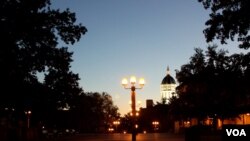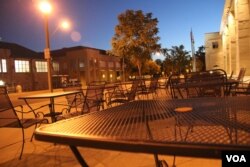Around midnight on a hot summer night at the University of Missouri, I noticed students playing soccer on a well-lit lawn.
A few minutes later as I crossed into the student center, I saw a group studying together while another fell sleep on a couch without closing his textbook.
Through the glass walls of Walter Williams Hall, the main building of the journalism school where I was enrolled, I could see a meeting room and its TVs still broadcasting breaking news.
Although I was new to campus and far away from home in Beijing, as I walked back to my apartment at midnight, I didn’t feel alone.
The “lights on” phenomenon is something I thought a lot about at Mizzou, the nickname for University of Missouri. In China, where I grew up, public spaces are less illuminated and typically locked up at night.
As I finished my schoolwork late one night, I did not see one person in the lobby, but all lights were on.
“This is a really great place to study for my finals at night,” I thought, “but it seems like this lobby is really wasting electricity if every night it is lit like it is tonight.”
In China at my high school, we kept only pathway lights on at night. Students, teachers and staff were free to turn on classroom and office lights, but only when the spaces were in use. The campus had streetlights as well, but I never saw the lobby lights of all buildings on during the night.
Other international students notice the same thing.
Yinzi Zeng said she liked the lobby lights.
“It makes me feel safe when I stay late on campus,” said the student from South China University of Technology in Guangzhou, who studied journalism at Mizzou and graduated with a bachelor’s degree in December 2016.
Zeng said she thought U.S. colleges place fewer restrictions on students about using energy.
“In my college in China, our dorms will lock the doors at 10 p.m. No student is allowed to stay in any lecture hall at night,” she said. Guards would clear students from buildings and turn off lights, she explained.
“We even turned off playground lights every night,” said Yijun Zou, a graduate student at Missouri School of Journalism who earned her bachelor’s degree in public affairs in China Agricultural University. “Students are allowed to stay in lecture halls at night to study, but all of us will be gathered in a specific classroom instead of studying wherever you like.”
Mizzou campus facilities responded that keeping lights on at night is for safety.
“A portion of the lights in entrances, hallways and stairwells remain in service for the safety of our students, faculty, staff and visitors,” explained Karlan Seville, a communication manager for campus facilities at University of Missouri. “There are many spaces on campus with evening and night activities. The lights will be on in these locations.”
While experts debate how effective lighting is on fighting crime, Yijun Zou said she feels safer at Mizzou compared with college in China during the night because of lights.
Seville said the Mizzou campus has been starting using more motion detectors, auto dimming technologies, and LED lights to reduce energy since 1990s. So far, Mizzou has reduced energy use by more than 21 percent per square foot.
What culture shock have you experienced coming to America? Please leave a comment here, and visit us on Facebook, Twitter, Instagram and LinkedIn, thanks!
A few minutes later as I crossed into the student center, I saw a group studying together while another fell sleep on a couch without closing his textbook.
Through the glass walls of Walter Williams Hall, the main building of the journalism school where I was enrolled, I could see a meeting room and its TVs still broadcasting breaking news.
Although I was new to campus and far away from home in Beijing, as I walked back to my apartment at midnight, I didn’t feel alone.
The “lights on” phenomenon is something I thought a lot about at Mizzou, the nickname for University of Missouri. In China, where I grew up, public spaces are less illuminated and typically locked up at night.
As I finished my schoolwork late one night, I did not see one person in the lobby, but all lights were on.
“This is a really great place to study for my finals at night,” I thought, “but it seems like this lobby is really wasting electricity if every night it is lit like it is tonight.”
In China at my high school, we kept only pathway lights on at night. Students, teachers and staff were free to turn on classroom and office lights, but only when the spaces were in use. The campus had streetlights as well, but I never saw the lobby lights of all buildings on during the night.
Other international students notice the same thing.
Yinzi Zeng said she liked the lobby lights.
“It makes me feel safe when I stay late on campus,” said the student from South China University of Technology in Guangzhou, who studied journalism at Mizzou and graduated with a bachelor’s degree in December 2016.
Zeng said she thought U.S. colleges place fewer restrictions on students about using energy.
“In my college in China, our dorms will lock the doors at 10 p.m. No student is allowed to stay in any lecture hall at night,” she said. Guards would clear students from buildings and turn off lights, she explained.
“We even turned off playground lights every night,” said Yijun Zou, a graduate student at Missouri School of Journalism who earned her bachelor’s degree in public affairs in China Agricultural University. “Students are allowed to stay in lecture halls at night to study, but all of us will be gathered in a specific classroom instead of studying wherever you like.”
Mizzou campus facilities responded that keeping lights on at night is for safety.
“A portion of the lights in entrances, hallways and stairwells remain in service for the safety of our students, faculty, staff and visitors,” explained Karlan Seville, a communication manager for campus facilities at University of Missouri. “There are many spaces on campus with evening and night activities. The lights will be on in these locations.”
While experts debate how effective lighting is on fighting crime, Yijun Zou said she feels safer at Mizzou compared with college in China during the night because of lights.
Seville said the Mizzou campus has been starting using more motion detectors, auto dimming technologies, and LED lights to reduce energy since 1990s. So far, Mizzou has reduced energy use by more than 21 percent per square foot.
What culture shock have you experienced coming to America? Please leave a comment here, and visit us on Facebook, Twitter, Instagram and LinkedIn, thanks!






